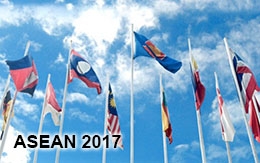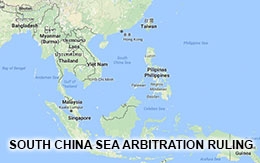The South China Sea Case and the Potential Utility of International Law for Conflict Mitigation and/or Resolution
Even absent obvious paths towards joint development mechanisms in light of the South China Sea award the case has furthered the legalisation of the dispute, which helps contains the likelihood of military confrontation.

Overview
In areas where maritime delimitations remain unresolved and there are overlapping potential claims to exclusive economic zones, it is not uncommon to find examples of jointly managed fisheries or oil and gas deposits. These are normally termed ‘provisional arrangements’ (see below) with the label ‘joint development’ normally referring to arrangements following the delimitation of a boundary.
Of many examples internationally of either provisional arrangements or joint development, one could consider models including:
-
the South Korea/Japan or UK/Argentina provisional arrangement zones;
-
the Norway/Russia joint fishing ‘grey zone’ provisional agreement of 1978-2011;
-
the South Korea/Japan joint fisheries agreement of 1999 (a provisional arrangement); or
-
the long proposed but never-quite-eventuating Israel/Cyprus natural gas joint development agreement following the 2010 delimitation of their maritime boundary.
Indeed such cooperation may seem required, or at least strongly encouraged, under Article 74(3) and 83(3) UNCLOS which provide that, pending delimitation of overlapping EEZ and continental shelf claims, States with opposite or adjacent coasts:
‘shall make every effort to enter into provisional arrangements of a practical nature and, during this transitional period, not to jeopardize or hamper the reaching of the final agreement.’
According to the Guyana v Suriname case this involves, at the least, obligations to:
-
actively negotiate in good faith; and
-
avoid activities ‘lead[ing] to a permanent physical changes, such as exploitation of oil and gas reserves’ in the area unless there is mutual agreement.
Unilateral acts not leading to permanent physical changes, such as seismic exploration are, therefore, permitted.
While there is no duty to successfully conclude joint development zone agreements, there is a legal duty to pursue negotiations to that end in a ‘conciliatory’ spirit and with a willingness ‘to make concessions’. Implicitly, absent such a willingness to engage in genuine negotiations towards interim measures the price of disagreement may be that activities involving ‘permanent physical changes’ are impermissible and valuable resources go underutilised as a result.
The difficulty, of course, in light of the South China Sea Case is that there would appear to be little to delimit and little willingness on any side to make concessions. It certainly seems unlikely that the Philippines will lightly abandon the legal advantage it has obtained in a ruling which finds that there are no possible overlapping EEZ entitlements as between it and China. At most it might be that some of the maritime features found in the award to be rocks may belong to China, resulting in enclaved territorial seas.
Although the findings of the award are formally binding only upon the parties to the case, the logic of the award plainly favours the position of Vietnam in the dispute between it and China concerning the Paracels. Under such circumstances, it seems unlikely that coastal States adjacent the nine dash line would concede there is an area of overlapping entitlements to jointly manage pending delimitation.
At least in respect of fisheries management there may, however, be some limited scope for the establishment of a new regional fisheries management organisation (RFMO) as a means of joint management. The prospect is unlikely, but less unlikely than a convention joint development mechanisms which might implicitly concede that there are overlapping entitlements to delimit. Certainly, there are examples of RFMOs which have management roles both in respect of high seas stocks and fisheries within member States’ EEZs, such as the African Subregional Fisheries Commission. The establishment of an RFMO may not seem a politically likely outcome but, I would submit, it is a more realistic prospect than a ‘grey zone’ or ‘provisional arrangements’ agreement which might implicitly concede the legitimacy of the Chinese claim.
Provisional arrangements or joint development zones
The advantages of provisional arrangements are reasonably obvious. Overlapping maritime claims may ‘pose a constant irritant in bilateral relations’ undermining ‘peace and stability’ and hinder effective:
-
‘resource exploration and exploitation’;
-
‘conservation of living resources’;
-
measures to protect the marine environment; and
-
maritime law enforcement ‘against illegal activities’, especially IUU fishing.
Provisional arrangements have the potential to allow effective utilisation, management and protection of resources pending final delimitation. They are thus widely promoted in the literature as a worthwhile dispute management tool.
Nonetheless, as Schofield indicates there are a number of clear potential difficulties with provisional arrangements. The first is that they necessarily require a high degree of cooperation between the parties. They thus require significant political will to implement and the terms of their implementation risk, becoming a further source of dispute or vulnerable to changes in government policy or public sentiment on either side. There is also the distinct risk that they can be seen as incentivising or rewarding excessive maritime claims. When bound up with nationalist sentiment there is a risk that any such agreement may be seen as unduly compromising sovereign rights, and the simple act of entering in principle agreement to joint development may provoke a local political backlash. There may also be problems if the states involved favour different systems of resource exploitation management (such as conventional concessionary agreements as opposed to production sharing contracts). Finally, one may question their practical significance. As Schofield notes: ‘Although there are now more than 20 joint development arrangements of various kinds around the world, few of those have actually resulted in significant development.’
Schofield also makes the point that provisional arrangements are less likely to work the more complex the dispute, especially if there are more than two potentially affected parties. None of this bodes well for provisional or joint development arrangements in the South China Sea.
...
Douglas joined the Faculty of Law at Monash University in 2015 as an Associate Professor. He is the author of "Shipping Interdiction and the Law of the Sea" and has consulted on law of the sea issues to numerous international organisations and governments.
The paper was presented at the Conference: "The South China Sea in the Broader Maritime Security of the Indo-Pacific Conference", 28-30 September 2016, Canberra, Australia. This conference is co-organized by UNSW Canberra at the Australian Defence Force Academy (ADFA), the Diplomatic Academy of Vietnam (DAV), and the Japan Institute for International Affairs (JIIA).










